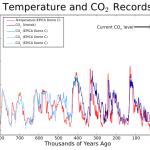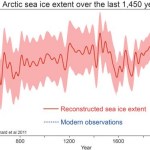paleoclimate
A commenter on the most recent edition of het's AWOGWN asks an interesting set of questions:
How would temperature data have been seen during the last 10,000 years prior to the peak of each of the previous Milankovich cycles? What caused the temperature to reverse course in those cycles and why would we not expect it to occur again this time?
First, here are the quick answers to those three questions, then some discussion. 1. It is not currently possible to resolve the temperature record that long ago to anything close to what we have today. 2. The cause of the temperature…
Sometime, about one year from now, the front pages of whatever decent newspapers are left will carry a headline like the one above, announcing that for the first time in human existence (or in nearly a million years, or 3 million years, or 15 million years), the global atmospheric concentration of carbon dioxide – the principal gas causing climate change – will have passed 400 parts per million.
That’s a significant and shocking figure. Unfortunately, it is only a temporary marker on the way to even higher and higher levels. Here (Figure 1 below) are the most recent (March 2013) data from the…
"Show me the code!" This is the rallying cry of climate "skeptics" everywhere and the foundation of the numerous climate conspiracy insinuations hurled around the blogosphere.
Well, apparently what is good for the goose, the infamous Hockeystick, is not so good for the gander, the Wegman Report.
Please see John Mashey's article on Desmog Blog.
Where is the code promised to Waxman almost 6 years ago? Dr. Mann's code was written for a research paper in 1999. Wegman's was used for a high-profile Congressional report widely publicized by Reps. Joe Barton and Ed Whitfield, announced in the…
No, this is not Steve McIntyre finally coming out with his own multi-century proxy temperature reconstruction. Nor is it Anthony Watt's release of his surfacestations.org temperature reanalysis.
It is the take away figure from a recent paper in Nature by Kinnard et al that reconstructs the extent of arctic sea ice over the last 1450 years.
Tamino has a discussion of it here.
There is not really much to add to the thousand words that image conveys.
From greenman3610, Climate Crock of the Week gives a thorough review and debunking of "hide the decline" including the latest on Muller and the BEST project.
Also, if you are interested in the unfolding nuclear calamity in Japan, ClimateCrocks blog has been providing great coverage.
Barak Obama has finally released his long form birth certificate. Will it satisfy the Birthers?
(Yes, there is a climate connection. Check the links!)
The wheels continue to fall off the Wegman Report.
"It kind of undermines the credibility of your work criticizing others' integrity when you don't conform to the basic rules of scholarship," Virginia Tech plagiarism expert Skip Garner says.
Further down:
Allegations under review
"The matter is under investigation," says GMU spokesman Dan Walsch by e-mail. In a phone interview, Wegman said he could not comment at the university's request. In an earlier e-mail Wegman sent to Joseph Kunc of the University of Southern California, however, he called the plagiarism charges "wild conclusions that…
Most of us interested in climate science understand the uniqueness and importance of deep ice cores. It is truly a remarkable record of many aspects of past climate including dust, methane, sea level proxies and carbon dioxide.
The video below (a YouTubed TED Talk)is a very fascinating look at what it takes to retrieve one.
(warning, the last 3 or four minutes are a Rolex commercial)
Cheers to Thingsbreak for posting it where I could see it!
This is just one of dozens of responses to common climate change denial arguments, which can all be found at How to Talk to a Climate Sceptic.
Objection:
Today's warming is just a recovery from the Little Ice Age.
Answer:
The problem with this argument is that it relies on an implicit assumption that there is some particular climate that the earth needs to be at and that given a period of globally lower temperatures, an eventual rise is inevitable. What is the scientific basis for such an assumption?
There is no evidence that such a situation exists. The climate is influenced by many…
This is just one of dozens of responses to common climate change denial arguments, which can all be found at How to Talk to a Climate Sceptic.
Objection:
Climate science can't even fully explain why the climate did what it did in the past. How can they then claim they know what is going on today?
Answer:
There are two requirements for understanding what happened at a particular climate change in geological history. One is an internally consistent theory based on physical principles and the other is sufficient data to determine the physical properties involved. It is very hard, in some…
This is just one of dozens of responses to common climate change denial arguments, which can all be found at How to Talk to a Climate Sceptic.
Objection:
In the geological record it is clear that CO2 does not trigger climate changes. Why should it be any different now?
Answer:
Given the fact that the human species and our industrialization is rather unique in the history of planet Earth, do we really need to see some kind of historical precedent for CO2 triggered climate change before accepting what we observe today? Surely unprecedented consequences are not far fetched in the face of…
This is just one of dozens of responses to common climate change denial arguments, which can all be found at How to Talk to a Climate Sceptic.
Objection:
Global Warming has been going on for the last 20,000 years.
Answer:
It is quite true that 20Kyr ago the temperature was some 8 to 10oC colder than it is today, but it is highly arbitrary and dubious to simply draw a line from that point to today and say "Look! 20K years of Global Warming!". If you have look at this nice graph of temperature starting at a point when we were finishing the climb out of deep glaciation, you can clearly see…
This is just one of dozens of responses to common climate change denial arguments, which can all be found at How to Talk to a Climate Sceptic.
Objection:
Newfoundland was so warm in the Medieval Warm Period that when the Vikings landed they called it Vineland and brought boatloads of grapes back to Europe.
Answer:
One can not infer a global climate from an anecdote about a single region, or even a few regions, you need detailed analysis of proxy climate indicators from around the world. These proxy reconstructions have shown that the Medieval Warm Period (around the time the Vikings were…
This is just one of dozens of responses to common climate change denial arguments, which can all be found at How to Talk to a Climate Sceptic.
Objection:
Greenland used to be a lovely hospitable island when the Vikings settled it. It was not until the Little Ice Age that it got so cold they abandoned it. During that time, it was clearly not the frozen wasteland it is today.
Answer:
Firstly, Greenland is just a part of a single region and as such can not be assumed to represent any kind of global climate shift. See the article on the Medieval Warm Period for a global perspective on this…
This is just one of dozens of responses to common climate change denial arguments, which can all be found at How to Talk to a Climate Sceptic.
Objection:
If you look back over the last 600 million years you see that there really is not much correlation between temperatures and CO2 levels. Clearly CO2 is not a climate driver.
Answer:
While there are indeed poorly understood ancient climates and rather controversial climate changes in Earth's long geological history, there are no clear contradictions to greenhouse theory to be found. What we do have is an unfortunate lack of comprehensive…
This is just one of dozens of responses to common climate change denial arguments, which can all be found at How to Talk to a Climate Sceptic.
Objection:
The current warming is just part of a natural cycle.
Answer:
While it is undoubtably true that there are some cycles and natural variations in global climate, anyone who wishes to insist that the current warming is purely natural or even just mostly natural has two challenges. Firstly, they need to identify just what the mechanism is behind this alleged natural cycle, because absent a forcing of some sort, there will be no change in…
This is just one of dozens of responses to common climate change denial arguments, which can all be found at How to Talk to a Climate Sceptic.
Objection:
It was just as warm in the Medieval Warm Period (MWP) as today, in fact Greenland was green and they were growing grapes in England.
Answer:
There is actually no good evidence that the MWP was indeed a globally warm period comparable to today. Regionally, there may have been places that did exhibit notable warmth, Europe for example, but all of the various global proxy reconstructions agree that it is warmer now and the temperature is…
This is just one of dozens of responses to common climate change denial arguments, which can all be found at How to Talk to a Climate Sceptic.
Objection:
It was even warmer than today during the Holocene Climatic Optimum without any human influence.
Answer:
Actually, it turns out that though there may have indeed been some temperatures in the same range as today, this was regional to the northern hemisphere and confined to the summer months! What's more, the cause is understood (orbital forcing similar to what controlled the Ice Ages), just as today's cause is understood (CO2 emissions),…
This is just one of dozens of responses to common climate change denial arguments, which can all be found at How to Talk to a Climate Sceptic.
Objection:
Climate has always changed, why are we worried now and why does it have to be humans fault?
Answer:
Yes, climate has varied in the past and it has varied for many different reasons, some better understood than others. The present day climate change is very well understood and is different. Simply noting that something happened before without humans does not in any logical way show that humans are not causing it today.
For example, we see…

